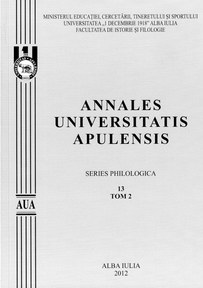SEMANTICA IMAGINARULUI ÎN POEZIA BLAGIANĂ
The semantic of the imaginary in Blaga’s poetry
Author(s): Dănuța Magdalena PruneanuSubject(s): Language and Literature Studies
Published by: Universitatea »1 Decembrie 1918« Alba Iulia
Keywords: imaginary; artist; Blaga; language; poetic myth
Summary/Abstract: “The mystical dimension of literature” manifested, especially in the interwar period by the presence of great names of the literature in their center of them being, without doubt, the poet and philosopher Lucian Blaga. What characterizes “the domain of Blaga’s imaginary” is what the unity and the foundations confer “organic structure and dynamics” of the whole work, whose sensible universe derived from the purest form of life, the light. No doubt that the imagination, as the first way of understanding and of perception of thought, conceived, “in terms of substantiality or as organic base or physiologically or in terms of irationalist philosophy”, captured the attention of the poet-philosopher both in prose and in poetry or drama. Passing through the greatness of The Prophet's Footsteps, In the Great Passage, joining the Praise of Sleep to At the Watershed and At the Courtyard of Yearning, the poet went, unhindered, the Unsuspected Steps, as a reconciliation between the artist and the universe to the steps of wisdom and hope realized to germination aura in the noumenal tear, derived from the name of the native Lancrăm. This explains, to some extent, the beginning with the volume Poems of Light, which did not only raised awareness but also revived the concept of knowledge that integrates the symbolism of what the poet called by the revealing metaphor “the wonders’ corolla of the world”. The transient function of the revealing metaphor as “trans-significant myth” of the native area, will receive the original symbol representations called by analogy, ”center” found in “moon”, in “mountains”, in “borders” and even in “people”. The metaphorical visions, as means of knowledge, appear from the function specific both for the metaphor and for the philosophical (cosmological, and ontological gnoseologic) metaphor, from where the subsequent transfer derives from the mythical language of the poetic, in the top of which is, under any circumstances, the “Great Anonymous”. Symbols of language spatiality, words are against the non-being that gives ideality to the poetry, from silence, from “the words we don’t speak and which just discover and the boundless creation”, taken and recognized in the portrait from where the snow creature takes place of the word. (Self Portrait). M. Dufrenne considered in the study dedicated to the poetic that the “symbol is poetry in nature, but a nature that speaks and inspires the witness and the expression, we say, of Nature which talks to us itself”, a nature that communicates by the language semantics, diverting the denotative meaning in the connotative one, from the transitive to reflexive, found in the blessings gained from the hopeless tear that substitutes the being and non-being.
Journal: Annales Universitatis Apulensis. Series Philologica
- Issue Year: 13/2012
- Issue No: 1
- Page Range: 485-493
- Page Count: 9
- Language: Romanian

